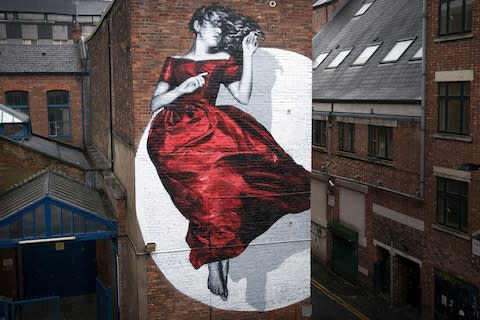The industrial UK city where the suffragette movement was born
![Manchester's industrial past is all around the city - www.sakhanphotography.com (www.sakhanphotography.com (Photographer) - [None]](https://s.yimg.com/ny/api/res/1.2/ZBR_fjVT2a8PhGadezgn7w--/YXBwaWQ9aGlnaGxhbmRlcjt3PTEyNDI7aD03NzY-/https://media.zenfs.com/en-GB/homerun/the_telegraph_818/4a487b268511310086dc71d0c0e1cc73)
Tomorrow, Manchester will mark the centenary of the first general election in which British women were permitted to vote with the unveiling of a statue of Emmeline Pankhurst in St Peter’s Square (at midday).
The likeness of Pankhurst will be only the second staue of a woman in the city, joining Queen Victoria, unveiled in 1901 in Piccadilly Gardens, and was chosen by the public from a shortlist of women who have made a significant contribution to Manchester.
A bold political activist, Pankhurst was born in Moss Side in 1858. Frustrated by the lack of progress in the campaign for votes for women, she set up the Women's Social and Political Union (WSPU) in her parlour in 1903. The female-only party was deliberately provocative and later became known commonly as the suffragettes.
For those keen to discover more about Pankhurst and delve into the history of this hugely important movement, there are plenty of places in Manchester to explore.
The Pankhurst Centre
The house that Emmeline Pankhurst moved to following the unexpected death of her husband, Richard, can be found just off Manchester’s busy Oxford Road, now incongruously surrounded by hospital buildings.

It was here that Pankhurst held the first meeting of the WSPU, and the parlour in the house has been set up to replicate what it may have looked like on that day. Now a small museum run by a team of volunteers, this is a great starting point. Make sure you walk around the garden created to commemorate the hard work of the suffragette movement, and funded by a crowdfunding campaign.
The centre is open on Thursdays (10am-4pm) and every second and fourth Sunday (1pm-4pm); entrance is free; pankhursttrust.org/pankhurst-centre.
The People’s History Museum
The People’s History Museum (PHM) is currently showing the Represent! Voices 100 Years On exhibition that will run until February 3. This not only looks at the lives and cause of the suffragists and the militant suffragettes, but uses their plight as a springboard to examine how far society has really come in 100 years, highlighting various individuals and groups still campaigning for better representation.
In pride of place is a Manchester suffragette banner, which was recently found in a charity shop in Leeds, and states that Manchester was: “First in the fight”. The exhibition emphasises that the battle for equality is still ongoing, with items such as a Sisters Uncut jumpsuit from the 2018 Bafta protest sitting next to a suffragette outfit.

Elsewhere in the museum, you can see the arrest warrant and certificate of 16-year-old suffragette Alice Nobel as well as a range of political banners and anti-Suffragette propaganda.
The museum is open every day 10am-5pm and every second Thursday of the month until 8pm; entrance is free; phm.org.uk
Stevenson Square
This square in Manchester’s hip Northern Quarter was once a popular meeting place for protestors and many suffragette meetings were held here. Just off the square on Little Lever Street there’s also a striking piece of street art called ‘Serenity’. Inked at the beginning of 2018 by the stencil art duo SNIK, the huge painting of a woman in a red dress is a tribute to all women who stand against injustice.
Serenity can be found on Little Lever Street, behind the Cow Hollow Hotel and next door to the Greater Manchester Police Museum.

Manchester Central Library
Visit the archive section of Manchester Central Library in St Peter’s Square to flick through the microfilm collection of letters and pamphlets from the women’s suffrage movement. You can watch scenes of a suffragette procession through Trafalgar Square in the library’s BFI film pods, during which Sylvia Pankhurst was arrested, as well as the first ever representation of suffragettes in a British film. Made in 1899, the women represented in the movie are played by men in drag.
Another library worth visiting is the Working Class Movement Library in Salford. Here, you can see the Votes for women… or votes for ladies? exhibition until January 31.
New Manchester Walks
Knowledgeable writer and tour guide Ed Glinert runs monthly Suffragette City/Pankhurst tours through New Manchester Walks. Ed will guide you around sites important to Pankhurst and her family with stops at the Free Trade Hall (now the Radisson Blu Edwardian, Manchester) where Christabel Pankhurst and Annie Kenney famously disrupted a Liberal Party meeting; the spot where a Manchester workhouse once stood (now an Emporio Armani shop) and which Pankhurst visited as a Poor Law Guardian; and Manchester Art Gallery, where three suffragettes vandalised a number of paintings in 1913. You’ll also visit the little-known spot where Emmeline Pankhurst ran a draper’s shop on King Street (now Bravissimo).
Private tours available on request; newmanchesterwalks.com; group tours cost £10.


